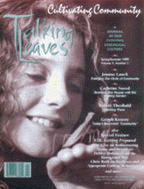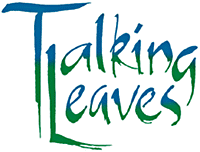

Startled by quivering creature contact I shifted and sat up; the rodent scampered up the tree a ways, but just a little ways. Realizing I had been visited by a Northern Flying Squirrel, I smiled and bade it good night and again nestled down feeling safer and more comfortable in my treetop bed knowing the natives felt comfortable approaching me. Then it ran up my body and welcomed me face to furry face. I think I'm going to stay a while! Then, briefly and tentatively, the flying squirrel sat on my face.
The next morning I watched a pair of these wing-flapped rodents as they sat on our porch checking out me, my human neighbors, and our food. Our food secured in buckets, they settled on gnawing on newsprint. They looked at us bravely with black eyes that said, "Okay, you can stay." There is no question who is a guest in whose home here.
Have you ever seen a flying squirrel "fly"? A flying squirrel can leap from a tree branch and glide up to 200 feet downward through the canopy to another tree. These creatures glide on flaps of skin that unfold between their forearms and their sides. They can steer themselves left and right as they glide, and their flaps come all the way out like parachutes as they land gently and stealthily on a branch. They can also dive-bomb.
I'm sitting 150 feet up between the massive trunks of two magnificent old growth Douglas Fir trees and one old Hemlock. This 96 total acres of publicly owned, rare, low-elevation, old growth forest, above the North Fork of Fall Creek in the Willamette National Forest, is slated to be clear-cut. Known as the Clark timber sale, this popular recreation area has been temporarily spared from logging due to ongoing attention which began last April when a village of treesitters moved into treehouses that reach heights of 210 feet into the upper canopy. They called their camp Red Cloud Thunder. To this day these forest defenders continue to speak out in favor of a bill introduced in Congress to end corrupt logging on public lands.
These trees were supposed to be cut down last spring by Zip-O-Sawmills of Eugene, Oregon, Zip-O is now taking a wait and see approach. This area was once set aside and protected as critical habitat for the Northern Spotted Owl. The Spotted Owl is an indicator species, which means its decline is a reflection of the decline of many other rare, old growth forest dependent species. Even though the Forest Service is breaking the law by logging US Fish and Wildlife Service designated "critical habitat," and also breaking the law by not surveying for rare and sensitive species, the Forest Service continues to maintain that Congress has given it the authority to break the laws. Congress says this is necessary in order to put out the annual yield in board feet that it promises to industry.
Since the Northern Flying Squirrel, prime Spotted Owl food, is not considered "threatened," their habitat is considered expendable by Congress, though the truth is that the unprotected old growth patches of this forest are one last sanctuary for these beautiful native aeronauts. And since a squirrel rarely ranges beyond a 30-acre area, these Fall Creek flying squirrels certainly will die. We, their human relations, can help them by living with them in the trees. You can help us by sending a message to your federal representatives, to the Forest Service and to Zip-O-Sawmills. STOP LOGGING OUR PUBLIC-OWNED FOREST LANDS!
I am not uncomfortable or unhappy here on this dark winter night, on a hanging cushioned platform with a tarp roof, listening to the radio and writing by candlelight. I am not cold or hungry, there is nothing I need that I don't have. I don't have any money, but what would I do with that up here? When I go to bed and blow out the candles, a flying squirrel might approach me and run across my face. It might even bust into the flour bag by my head again. I don't mind, I like the little critters. And as comfortable and happy as I am in their home, I know there are plenty of other places I could go on this earth and survive. Not so for the flying squirrels. If we leave their treetop homes, their homes are coming down. Our departure would leave the squirrels at the mercy of the US Forest Service and Zip-O-Sawmill trying to make a quick buck.
And the trees would fall. And the squirrels would fly from tree to tree, and tree after tree would fall and still they would flee, until nothing was left but the few sparsely separated trees marked orange in spray paint around their trunks, the diseased trees, the dead snags, the "not suitable for timber harvest" rejects. But these would be few and far between, further than a flying squirrel can fly. And there's nowhere to go, nothing to eat in the air or on the ground and there are giant industrial machines turning and churning all around. The flying squirrels have nowhere to fly, and so they die. How could we possibly leave these trees, knowing the flying squirrels and their plight?
People tell me I'm wasting my time, to get a "real job," to live in the "real world." But what could be more real than the wind and the rain, the sway of a big ancient tree, the mountains in the distance, the red clouded sunset, the hoot of an owl or a growl in the night, the fluttery, fidgety feeling of furry little feet on my face and in the flour?
Take Action:
1) Please call, write, or e-mail your Government representatives and ask them to stop the corrupt logging program that "manages" our public lands and to support the National Forest Protection Act.
2) Call Zip-O-Sawmills: (541) 343-7758, and tell them: Don't cut the Clark Timber Sale!
3) Call, write, or e-mail the Forest Service and tell them to shut down the Clark Timber Sale! Willamette National Forest: 211 E. 7th Ave., Eugene, OR 97440, (541) 465-6521, solson/[email protected]; Chief of the Forest Service Mike Dombeck: wo/[email protected].
4) Come live in the trees with us! or send us financial support: Cascadia Forest Defenders! PO Box 11122, Eugene, OR 97440, www.ecoecho.org, (541) 484-2997.
�1999 Talking Leaves
Spring/Summer 1999
Volume 9, Number 1
Cultivating Community
We welcome your letters!
For a sample copy of the Spring/Summer 1999 issue, "Cultivating Community," send $6 to
